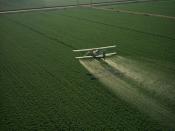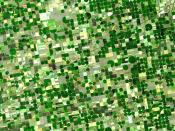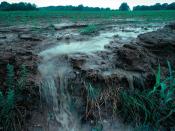Land pollution
Dumping waste.
90% of household wastes go into pits in the ground called landfills. There is a big problem with landfills in the UK filling up with disposable nappies. On average a baby goes through 6,000 nappies and Britain's parents throw away eight million disposables every day. Local authorities spend at least ã40m collecting and disposing of nappy waste. Ways to stop the pollution of so much land would be more recycling.
Leisure.
Costal resorts have been put under a lot of pressure because of the number of people going there on holydays. Most of the sewage systems were built over a hundred years ago. The content of sinks and lavatories were emptied into the sea. Sunlight and salt water destroyed most of the harmful micro orginisms. This system can no longer cope with the size of seaside towns. Some beaches in the UK are now unfit for paddling in and swimming.
Rainforests.
When the rainforest gets burned down it removes the protective covering for the soil from plants. The fierce rain-washes the soil away to se and in the dry season the sun's heat bakes the soil. The soil is soon replaced with a hard brick like layer called laterite.
Intensive farming.
Intensive farming causes problems for the pollution of land mainly because it puts two chemicals into the ground called pesticides and fertilizers. These help the farm grow crops but can have bad effects on the environment of the land where they have been spread another problem that it causes is the deforestation of woods and hedgerows.
Pesticides.
Pesticides and fertilizers are artificial chemicals that have been put on crops.
Pesticides are sprayed on crops to kill insects that damage the crop, but the sometimes kill harmless insects like bees and beetles. This can cause a...


